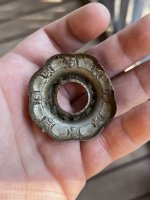Oroblanco
Gold Member
- Jan 21, 2005
- 7,838
- 9,830
- Detector(s) used
- Tesoro Lobo Supertraq, (95%) Garrett Scorpion (5%)
Seasons greetings amigos,
SWR wrote
Are you serious? That disclaimers concerning minor errors equates to PROVING THE CONTENT IS A LIE? You really believe that? I would laugh here but as it is possible that you truly DO believe it, that would be simply sad.
Oh and SWR - I don't want to hear another word of complaint from you, about how long MY posts are, when your friend Lamar's have beaten my own for sheer length and number of words on many occasions, yet we never see you once complain about those. I wonder why? Hmm....?
Gollum wrote
Sad but true - some have a cherished belief in the utter saintliness of those Jesuits, and certainly some of them were very good men indeed. Whom is so naive as to believe that every single one of them, from the General to the lowliest monk Lay Brother was equally altruistic? Apparently some folks are quite willing to, in the face of what ever amount of testimony and evidence to the contrary.
Cactusjumper wrote
Since it is still suspect in your mind, the logical thing to do would be to locate evidence and/or testimony(ies) to disprove these allegations.
SWR wrote <replying to our mutual amigo Gollum>
Neither did Mike say that the Jesuits were hiding huge hordes of treasure, that is your interpretation of his comment.
SWR also wrote
Perhaps you are unaware that simply picking up pieces of ore (or metal, or gems) from the natural surface of the ground does qualify as mining in the sense that it is harvesting the mineral.
Merry Christmas to you all,
Oroblanco
SWR wrote
Here ya go. Already posted, but happy to re-post. I'll even use annoying bold, as you always seem to do
The Jesuit Relations and Allied Documents Travels and Explorations of the Jesuit Missionaries in New France 1610—1791
General Prefix - "In short, no pains have been, or will be, spared to render all possible service to scholars, in the present work. <snip>
Are you serious? That disclaimers concerning minor errors equates to PROVING THE CONTENT IS A LIE? You really believe that? I would laugh here but as it is possible that you truly DO believe it, that would be simply sad.

Oh and SWR - I don't want to hear another word of complaint from you, about how long MY posts are, when your friend Lamar's have beaten my own for sheer length and number of words on many occasions, yet we never see you once complain about those. I wonder why? Hmm....?
Gollum wrote
So, basically, what this entire exercise proves to me is that there are some people who will never believe, no matter what evidence is presented them, in the idea of Jesuits doing ANYTHING bad or anything that netted them great wealth.
Sad but true - some have a cherished belief in the utter saintliness of those Jesuits, and certainly some of them were very good men indeed. Whom is so naive as to believe that every single one of them, from the General to the lowliest monk Lay Brother was equally altruistic? Apparently some folks are quite willing to, in the face of what ever amount of testimony and evidence to the contrary.
Cactusjumper wrote
I fear I many be graduating to the level of "ignorance", as I don't see a single thing in your post(s) that would qualify as incontrovertible. No doubt that is just a personal failing on my part.
I will continue to follow your evidence, as well as Roy's and Beth's, in an attempt to become educated on the matter.
Since it is still suspect in your mind, the logical thing to do would be to locate evidence and/or testimony(ies) to disprove these allegations.
SWR wrote <replying to our mutual amigo Gollum>
In the quote you supplied, Father Och did not say, specifically, the Jesuits were mining or hiding huge hordes of treasure.
Neither did Mike say that the Jesuits were hiding huge hordes of treasure, that is your interpretation of his comment.
SWR also wrote
There is absolutly nothing in the above quote that would lead on to believe the Jesuit's were mining gold/silver or caching it, to be recovered later.
Perhaps you are unaware that simply picking up pieces of ore (or metal, or gems) from the natural surface of the ground does qualify as mining in the sense that it is harvesting the mineral.
Merry Christmas to you all,
Oroblanco






 will be a big help in locateing these long lost settlements.
will be a big help in locateing these long lost settlements. Oh well, perhaps we can't sway your view Joe.
Oh well, perhaps we can't sway your view Joe. 







